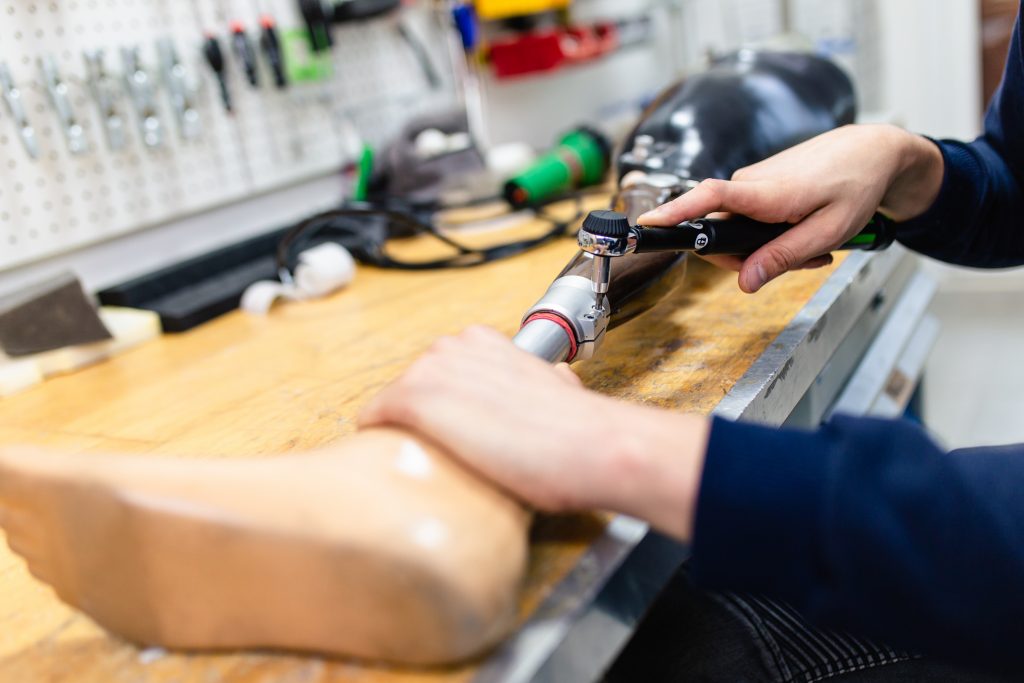Caring for your prosthetics
You rely on your prosthesis to walk and do other daily tasks, so it is important to take care of it properly. You can take out insurance for it to help pay for repairs or a replacement, but there are lots of things you can do to keep it in good condition too. It doesn’t require a great deal of work on your part – just a basic understanding of what to do and what NOT to do to ensure your prosthesis doesn’t degrade or become damaged.
Read on to learn the things you can do to maintain your prosthetics.
Keep it clean and dry
As with your residual limb, you should work on washing your prosthesis every day to prevent the buildup of things like dirt, sweat and germs. Use a damp cloth and a mild soap to clean the inside of the prosthesis. Carefully wash the socket that contacts with your skin, the soft liner (if applicable) and any rubber padding that is there.
You should not immerse the prosthesis entirely in water. Use a clean cloth to wipe off the soap and dry the prosthesis thoroughly. Most people wash it in the evening so that it can dry completely overnight, ready to be worn again the next day.
Check for loose fixings
With regular use, some of the moving parts of your prosthesis may come loose. You should check it regularly for screws or bolts that need tightening. If any adjustments are required, you will need the help of your prosthetist. Don’t choose to simply ignore any issues you notice – your prosthetics should be safe and comfortable at all times.
Always wear it correctly

Your prosthesis should fit properly – if it doesn’t, it could cause discomfort and even damage the prosthesis if you use it regularly. Be sure to fit it properly every day, and be aware of it shifting as your limb changes shape slightly. You will likely need to make small adjustments throughout the day to keep everything in its proper position.
Prevent water damage
If a standard prosthesis is immersed in either fresh or saltwater it can fall victim to water damage. You should never wear your prosthesis whilst showering, bathing or swimming. If you are interested in taking part in water sports, you should discuss the option of a waterproof prosthesis with your prosthetist.
Damage repair
You should inspect your prosthesis daily for cracks and any other damage. If you find that it has a small break or something similar, you should contact your prosthetist immediately to have it repaired. Trying to repair it yourself is risky, and if you simply ignore the problem then it will only get worse. It is best to have it professionally repaired at the earliest opportunity.
Correct shoe height

Be sure the shoes you wear are the correct height for your prosthesis. Otherwise, your alignment may be wrong, which will put undue strain on the prosthesis, your residual limb and the surrounding joints. The result could be additional wear and tear to the prosthesis as well as to your body, and it can all be avoided by wearing the correct shoes.
Correct storage
When you are not using your prosthesis, you should keep it propped carefully against a wall somewhere it will not be bumped or knocked over. You could also lay it flat on a sturdy surface where it won’t be stepped on or disturbed any other way. Avoid storing it in a hot environment, such as in direct sunlight inside a parked car, near a radiator or close to the oven.
Skincare
It is equally important to take care of your residual limb, as neglecting the skin could result in things like blisters, ulcers, or infections. Wash the limb at least once per day using mild soap and water. Pat it dry, and don’t put your prosthetic on until there is no remaining water. If you develop any sores or broken skin, or you experience undue aches and pains, contact your doctor and/or prosthetist right away.
Remember that you should not attempt to make any adjustments to your prosthesis by yourself. If you find that something becomes loose or starts working incorrectly, or it becomes uncomfortable, you should stop using it immediately and get in touch with your prosthetist. If you do have your prosthesis insured, any attempts to adjust or repair it yourself could invalidate your policy.

Take good care of your prosthesis and don’t try to adjust or repair it without professional assistance.

